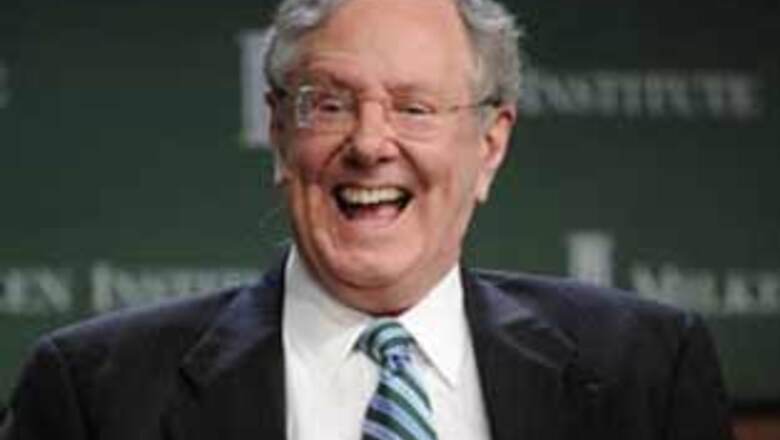
views
As the Obama administration works its way into reviving the US economy, and the Fed does its bit to stabilise the financial system, they have one critic who's not mincing his words — Steve Forbes, President & CEO, Forbes and Editor-in-Chief, Forbes Magazine. Steve said the crisis is a creation of the Fed and its policy of easy money over the last decade. "When the Fed created too much money for far too long, it provided the fuel for the housing bubble."
Forbes said that the Fed is in the grasp of academics who don’t know central banking. "Ben Bernanke came out of the academia, Allan Greenspan came out of the consulting business not Wall Street. So they are both guilty."
Here is a verbatim transcript of the exclusive interview with Steve Forbes on CNBC-TV18.
Q: I know that you hold the Fed guilty of over-fueling the economy. How about the markets when market’s position gets overwhelming, what choice does the Fed have? If they don’t come in, the market could collapse?
A: The thing I’d would like to say is; don’t create a market collapse in the first place. When the Fed created too much money for far too long, it provided the fuel for the housing bubble. We could have never had one the size that came into the US if the Fed hadn’t been pouring out fuel Freddie Mac and Fannie Mae also feel that these government corporations are guaranteed over a trillion dollars of jumped mortgages. So the Fed bears primary responsibility for it has been doing its job.
Now once the system went under cardiac arrest, the Fed should have been today more aggressive in getting the heart going again - the credit system is like the heart of a body; you can have great muscles, great brain but if the heart is not working, you have a problem. So the Fed since December has been very sluggish in doing something for the economy, it hasn’t pumped in one extra dollar.
Q: Would you say that a criticism made on the Fed that it is often in the grip of bankers or investment bankers is fair or is that unfair?
A: No, they are in the grip of academics who don’t know central banking. Ben Bernanke came out of the academia, Allan Greenspan came out of the consulting business not Wall Street. So they are both guilty and the system itself does not realize the core of a good Central Bank for a reserved currency for the world is a stable and strong currency not one that is weak.
Q:Do you see the banking community regaining the glory of earlier days or do you think that they have seen their best and there is not going to be the most envied job on the street?
A: These things go up and down after the great depression bankers were held in low and so those things do happen. The key thing for the large banks in the US is to get out of the clutches of the government. We have a peculiar situation, where several banks have made it clear that they want to repay this money that the government game them and several of these banks didn’t want the money in the first place but the government said take it. So, the quicker we liberate the banks from Washington, the quicker they will have the day come when people will respect them again.
PAGE_BREAK
Q: The day or the days after Lehman failed were possibly the scariest days we have seen in a very long time. Yet the markets didn’t collapse like they did in 1987. What was the difference?
A: First of all the markets have been in a decline since the fall of 2007 and so they were already down quite a bit when this (Lehman fall) hit. So, by the of the year 2008 was the worst year for US stock markets since the early 1930s in terms of an annual loss. The markets have been down 55 per cent till early March, which for the US is absolutely astonishing, something we hadn’t seen in decades. The panic though is not so much in the stock market which was steadily going down but in the credit markets in a way that we have never seen in our lifetime, they just absolutely froze up, just simply ceased. Everyone threw up their hands and ran for cover.
Q: The fall of the Union of Soviet Socialist Republics (USSR) destroyed faith in a communist way of allocating resources. Do you think the present crisis will do the same thing but dent people’s faith in capitalism?
A: It has dented people’s faith in entrepreneurial capitalism because the government created conditions that brought about a crisis. The amazing thing is that on the private sector if you do something wrong, you go out of business, must the government support you. But if the government fails, it gets bigger. It is rewarded for failure. So as we have discussed the Federal Reserve – I hope it creates the crisis, government entities like Freddie Mac and Fannie Mae helped crisis, regulators with their accounting roles deepen the crisis but it is yet even though they create conditions for the crisis, the private sector gets the blame, they didn’t do right but never would have happened on the scale it did if the government had been doing its part yet the government escapes blame.
Q: Do you think capitalism will survive because it is inherently a good system?
A: It is a good system but it can be undermines or severely crippled if the governments put on excessive regulations or make mistakes but I think in this open society we will eventually get things right – it is just a matter of time.


















Comments
0 comment